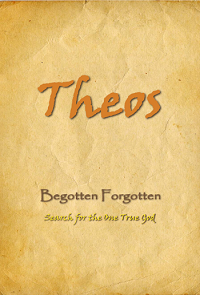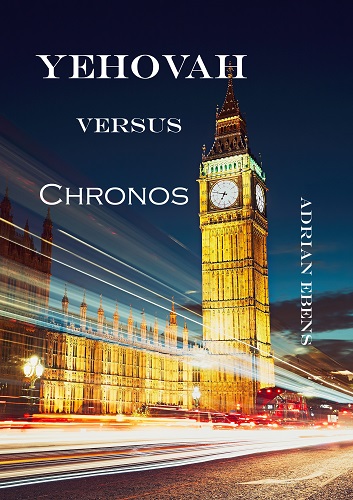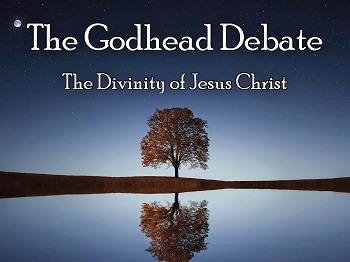No Other God's - A.T. Jones RH May 21, 1889
" I charge thee therefore before God, and the Lord Jesus Christ, who shall "judge the quick and the dead at the appearing and his kingdom, PREACH THE WORD."—2 Tim. 4 :1, 2. "THOU SHALT HAVE NO OTHER, GODS BEFORE ME."
SERMON BY ELD. A. T. JONES. Review and Herald May 21, 1889.
TEXT: "Thou shalt have no other gods before me." Ex. 20:3. The first commandment is now the subject of investigation. The first thing necessary in order to understand the commandment, and to know whom to obey is to know who God is, and what he is, that we may not have any other gods before him; because if we have wrong ideas in reference to God, we do not worship him, but another god.
There was once a people who supposed they were worshiping God, but they worshiped they knew not what. In John 4:22, we find this: '' Ye worship ye know not what." This was spoken to the woman of Samaria, by Jesus, and spoken of the Samaritans. This people always insisted that their worship was the true one, and that their city of Samaria was the right place in which to worship, yet the Saviour told the woman that they worshiped they knew not what. The trouble was that their people had wrong ideas of God, and as they could worship only according to the ideas which they had, they were worshiping a false god. But said the Saviour: "The hour cometh, and now is, when the true worshipers shall worship the Father in spirit and in truth: for the Father seeketh such to worship him." There is no true worship other than this. He must be worshiped in spirit because he is a spirit, and can only be so discerned. No one can know him otherwise. "Thou shalt love the Lord thy God with all thy heart, and with all thy soul, and with all thy mind." Matt. 22:37. So then with the mind I myself serve the law of God." Rom. 7:25.
With the mind, the spiritual part, man serves God, and the Holy Spirit enlightening and guiding us in all the holy ways of the Lord, shows us how we can worship him in spirit and in truth. Then certainly we, of all people, ought to know who and what we worship. Paul said, "I know whom I have believed." 2 Tim. 1:12. Do we? To attempt to worship God, and to entertain false views of him is to worship another god; that is, our views of God become our god, because we can worship only according to our thoughts. As we think God to be, so will the god be which we worship. If our views of God are wrong, we do not worship him, but another god, as truly as does the heathen who carves his out of wood. He knows it is not God because he made it, yet it embodies his idea of God, so he worships it. When we entertain wrong views of the character of God, we worship another god as really, though not as tangibly, as though we should embody that idea in the form of a perceptible image.
As we gain a living connection with God by his Spirit, we are guided into the truth according to the way we are to worship him, his word telling us what he is; so we must worship him as he has revealed himself in the Scriptures. What, then, has he said about himself? This question brings to mind the importance of the Saviour's words: ' ' Whosoever shall not receive the kingdom of God as a little child, he shall not enter therein." Matt. 10:15. In coming to the Scriptures, then, we must not have our own ideas, because the carnal mind cannot picture to itself the true God. We must be willing to accept without question what the Scriptures say of him. Let us lay aside, then, all preconceived ideas, and try to find out who and what God is, and worship him as he is, and love him and him alone, and with all the heart.
That God is a real being, and not, as some creeds make him out, "without body or parts," or as another, "without body, parts', or passions," we must believe, because his own word speaks of him in words that in every way imply real personality of being. The Bible says he loves. This is a sentiment, feeling, or passion; but how can he love, and be loved, as the Scriptures say he is, if he has no passions? That he has form, parts, and passions the Bible plainly shows. "And he said, I will make all my goodness pass before thee....Thou canst not see my face, for there shall no man see me, and live. And the Lord said, Behold, there is a place by me, and thou shalt stand upon a rock: and it shall come to pass, while my glory passeth by, that I will put thee in a cleft of the rock, and will cover thee with my hand while I pass by; and I will take away my hand, and thou shalt see my back parts; but my face shall not be seen." Ex. 33:19-23.
The originators of certain creeds refer to Deut. 4:14—19 to prove that God has no form or parts. It does not say, however, that when the Lord descended on Mount Sinai, there was no similitude there, only that the people saw no similitude; and Moses tells why God screened himself from their sight: ''Lest ye corrupt yourselves, and make you a graven image, the similitude of any figure, the likeness of male or female." There was danger that the people would copy the forms of the heavenly beings into images, and worship them. Did they not finally make a calf and worship it, and say: '' These be thy gods, O Israel, which brought thee up out of the land of Egypt"? Ex. 32:4. To prevent the people from so sinning, God shrouded himself and the holy angels in darkness. But God is real: " God, who at sundry times and in divers manners spake in time past unto the fathers by the prophets, hath in these last days spoken unto us by his Son,...who being the brightness of his glory, and the express image of his person, and upholding all things by the word of his power, when he had by himself purged our sins, sat down on the right hand of the Majesty on high." Heb. 1:1—3. There are too many such expressions for us to doubt that God has a person and parts: "Let this mind be in you, which was also in Christ Jesus: who being in the form of God, thought it not robbery to be equal with God.'; Phil. 2:5, 6.
All such texts prove that God is real, that he has a form. The ideas of the creeds are all not only contradictory to these assertions, but they are self-contradictory. They say that Christ is "very God of very Gods," that he was born of the virgin; that he died, was buried, and rose again, and ascended to heaven, where he sits at the right hand of God; and shall come again to judge the world. How, then, is it possible that he can be without body or parts? The trouble with the creeds is, they are man-made, and therefore express simply man's ideas. Let us read a few more verses, not that we can obtain a personal description of God, for the reason that he dwells in light to which no man can approach; but his dwelling, his throne, etc., have been seen, and I read about them to prove that he is an actual being. Paul tells us this: "But without faith it is impossible to please him; for he that cometh to God must believe that he is, and that he is a rewarder of them that diligently seek him." Heb. 11:6.
In the first chapter of Ezekiel will be found a beautiful description of God's throne; and if this chapter is compared with Rev. 19:5; 4:5, it will be found that the throne is not a stationary one of precious stones, or gold, but a living, moving throne. The "terrible crystal" mentioned by Ezekiel is the same as ''the body of heaven in his clearness" of Ex. 24:9,10. If, in connection with the bow that is in the cloud in the day of rain, spoken of by Ezekiel, Rev. 4:2-8, is read, it will be noticed that John saw exactly what Ezekiel describes. Let the 10th chapter of Ezekiel now be read; and although it is not possible to comprehend it all, some idea of the glory can be gathered, and also what the cherubim meant which were placed on the ark of the covenant, and embroidered on the curtains of the sanctuary; and why the priest in entering the holy of holies, carried incense to burn and form a cloud to shield him from the glory of the Lord. In Daniel is found a complete corroboration of the description of Ezekiel. (See chap. 7:9,10.) Hence there is pictured before us the throne of the living God, with all the surrounding hosts of heaven. Now, then, what is he?— "The Almighty;" the "Self-existing;" the "I am that I am." In the 4th chapter of Revelation John gives a beautiful picture of God and his holy attendants, and the living creatures under the throne and round about it: "And they rest not day and night, saying, Holy, holy, holy, Lord God Almighty, which was, and is, and is to come."
So much for the reality of God. Now how shall we worship him? He has described himself most perfectly, that we might learn what it is to worship him in spirit and in truth: "And the Lord descended in the cloud, and stood with him [Moses] there, and proclaimed the name of the Lord. And the Lord passed by before him, and proclaimed, The Lord, the Lord God, merciful and gracious, long-suffering, and abundant in goodness and truth, keeping mercy for thousands, forgiving iniquity, and transgression, and sin." Ex. 34:5-7. That is God, full of goodness and mercy. To be merciful is to treat an offender better than he deserves. "The Lord is not slack concerning his promise,...but is long-suffering to usward, not willing that any should perish, but that all should come to repentance." 2Peter 3:9. That is God, and "God is love." He delights in mercy, and is "a very present help in time of trouble." Every possible expression is used to show his goodness and his mercy; and so when we conceive the notion that God is not love, and that he hates us, our impressions lead us away from him. God hates sin, because sin is the very opposite of what he is; but he loves the sinner, and wishes to redeem him from the curse of sin. When we believe he hates the children of men, we do not worship him, but worship another god instead. We must search the Scriptures, and believe what he there says he is, and then worship him for what he is; so shall we have no other gods before him. We do not want any other god when we have one who is absolute perfection, one who is all kindness, love, mercy, and long-suffering to usward. What need can we have for another? And God has revealed himself in this character for you and for me—not for angels, but for us. If, then, we do not take him for what he reveals himself to be, we have another god. Every worshiper becomes assimilated to that which he worships. If we entertain wrong ideas of God, our worship will be wrong, and our character consequently wrong. God is pure, and he wants us to become so, and it is necessary that we understand him, that we may become as he is.
Let us, then, from this time on, worship God in spirit and in truth. Let us know what he is, that by the aid of his Spirit we may know whom we worship. "Let us, who are of the day, be sober, putting on the breastplate of faith and love; and for a helmet the hope of salvation, for God hath not called us unto wrath, but to obtain salvation." 1Thess. 5:8, 9. Our great trouble is that we commit sin, and then being ashamed of it and too proud to confess it, we hold God afar from us, and picture him as a stern judge instead of a merciful, long-suffering father. When we act thus, we worship a false god; and as we have no faith in the living God, we do not bring our sins to him, and thus begin a course of self-punishment; this is identically the way a heathen worships his false god. Every good and pure and tender word in the language of man has been used to express the goodness of God; and above all, the cross has been used to convince us of his tender compassion for us, God so loving the world that he gave his only begotten Son to die for us. This glorious Saviour who walked our earth, exemplifying all of these noble qualities, said: "He who hath seen me hath seen the Father." He was the manifestation of the Father whom we are to worship, and he the God revealed to us that we might be saved from our sins. Why, then, should we want another god? If we want to become pure and perfect, we must worship the God who combines all these qualities. Unless we believe that God possesses these qualities, we can never possess them ourselves. It becomes us to lay aside every doubt as to God's goodness, and worship him for what he is, that we may finally become like him. "And every man that hath this hope in him purifieth himself, even as he is pure." 1John 3:3. We cannot be like him unless we worship him as he is. We must not doubt God, or have any idea that he is anything but perfection in love and goodness. We must draw from him that strength and power that will make us pure and good. From him, through Christ, comes righteousness; and when we stand before his throne, clothed with that righteousness, then will we worship him as he is, and with all the heart. When we talk of God, we talk of Christ, for they are one. We worship God as the Creator of all, who is over all, above all, and who upholds all, by the word of his power and might. God was manifested in the flesh; so when one is mentioned, both are spoken of. He started the planets in their course, and they continue today according to his ordinances. Heaven, it is said, is the center of the universe. But to speak of the center of illimitable space, however, is virtually to speak of the center of that which has no circumference. We know that heaven is, and that it is the place where God, the Saviour, and the angels are; but more than that we cannot know.
In the effort to grasp the immensity of space, the mind is overwhelmed, and devoutly takes refuge in the contemplation of Him who made it all, and who is above and beyond it all,—our Father to whom all can come,—and with him another, our Saviour, counseling together. Blessed thought that it is a council of peace for you and me! Do we then want another god? Let his goodness, his love and purity, draw us to him, and let us worship him in spirit and in truth, so that when he comes, we may see him as he is. When we see God as he is revealed in the Bible, we do not feel the need of any other God. Then there is nothing fearful or terrifying about this commandment. In it there are peace, joy, and the blessed promise of the fullness of God.





